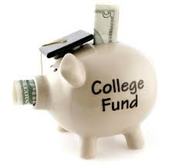
1. Does saving for college hurts my chance of getting financial aid?
If the saving is in a child's name — such as in a custodial account — it could have a big negative impact on potential financial aid, since financial aid formulas expect 35 percent of the student's assets to be spent each year on college.
But money in 529 college savings plans will have little impact since it's counted as a parental asset and less than 6 percent of the balance will be counted against financial aid.
Compared with assets, income counts far more heavily in determining financial aid, in any case. The more income you make, the more colleges will assume you've saved for college, whether you actually have or not.
Also, most financial aid these days comes in the form of loans, financial aid doesn't mean free money.
2. Will college always meet my financial aid needs?
Only about a third of public institutions and fewer than twenty percent private schools are committed to meeting 100 percent of their students' financial need, according to a 2008 study for the National Association for College Admission Counseling. The vast majority of colleges instead engage in "gapping," which means they deliberately leave a gap between a student's demonstrated financial need and what the institutions are willing to provide in terms of grants, scholarships, loans and work study.
3. Are private colleges always more expensive than public schools?
At first glance, this would seem obvious: the average published tuition and fees for in-state students at public four-year institutions was $8,893 in 2013-14, according to the College Board, compared to $30,094 for private four-year schools.
But colleges are like cars: few people pay the sticker price. And sometimes private schools discount their prices enough to make them competitive with public schools
Also, you may be paying for more years of school with a public institution. Only about one in five public college students graduates in four years, compared to about half of private college attendees, according to U.S. Department of Education statistics.
4. Can I expect my kid to work his way through school?
Working your way through community college is certainly do-able, and some motivated students support themselves long enough to get a four-year degree.
But study after study has made the point that the more hours a student works, the more likely he or she is to drop out. It's simply harder than it used to be to get an education on one's own.
The real cost of college has more than doubled since 1980. Also, Congress tightened the rules dramatically on who is considered "independent" for the purposes of financial aid, making it much harder for undergraduates trying to do it on their own.

 RSS Feed
RSS Feed
